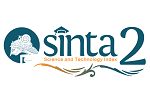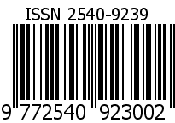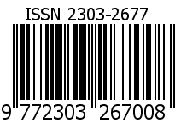Digital service development strategy in Ganesa Library, SMA Negeri 1 Cangkringan, Yogyakarta
Abstract
In the current digital era, libraries must develop digital-based services to remain relevant and meet users' increasing demands for fast and easily accessible information. This study investigates the strategic development of digital services at the Ganesa Library, the challenges encountered, and the measures taken to address them. Employing a qualitative research design with a case study approach, data were collected through interviews, observations, and document analysis involving the principal, head of the library, and librarians as key informants. Data validity was ensured through the triangulation of techniques and sources, while data analysis followed the interactive model of Miles and Huberman. The findings indicated that the digital service development strategy comprised three main stages: planning, implementation, and evaluation. The planning phase included needs assessment, goal formulation, feasibility analysis, budgeting, and establishing partnerships. During implementation, the library identifies specific digital services to be developed and delegates operational responsibilities. Evaluation was conducted through the identification of challenges and annual performance reviews. Major challenges faced included limited financial resources, shortage of qualified personnel, inadequate IT skills among librarians, and low utilization of existing digital services. To address these issues, the library organized workshops and seminars that promoted teamwork, encouraged effective communication, and adopted flexible budgeting strategies. These strategic efforts aim to enhance the quality and effectiveness of the Ganesa Library’s digital services, ensuring their continued relevance and responsiveness to users’ needs in the digital age.
Keywords
Full Text:
PDFReferences
Abdullah, M. (2014). Manajemen dan evaluasi kinerja karyawan. Aswaja Pressindo.
Acharya, S. K., & Tippanna, V. (2023). Library services marketing: An overview of strategies and outcomes. IP Indian Journal of Library Science and Information Technology, 8(1), 1–4. https://doi.org/10.18231/j.ijlsit.2023.001
Australian School Library Association. (2013). Future learning and school libraries. Australian School Library Association.
Burger, R. H. (2017). Financial management of libraries and information centers.
Bélanger, A. (2025). Artificial intelligence: Considerations for library public service delivery column. Perspectives on Public Services, 3(1), 1-7. https://doi.org/10.1080/10572317.2025.2479281
Bustari, M. (2019). Program pengembangan layanan perpustakaan di Sekolah Menengah Atas: Studi kasus di SMAN 2 Bantul. Jurnal Manajemen Pendidikan: Jurnal Ilmiah Administrasi, Manajemen dan Kepemimpinan Pendidikan, 1(2), 130–146.http://dx.doi.org/10.21831/jump.v1i2.42350
Chisita, C. T., Chiparausha, B., Tsabetse, V., Olugbara, C. T., & Letseka, M. (2022). Remaking academic library services in Zimbabwe in the wake of COVID-19 pandemic. Journal of Academic Librarianship, 48(3). 1-6. https://doi.org/10.1016/j.acalib.2022.102521
Clark, C., & Teravainen-Goff, A. (2018). Mental well-being, reading and writing how children and young people's mental well-being is related to their reading and writing experiences. National Literacy Trust Research Report. https://files.eric.ed.gov/fulltext/ED593894.pdf
Connaway, L. S. (2015). The library in the life of the user engaging with people where they live and learn. OCLC Research. https://www.oclc.org/content/dam/research/publications/2015/oclcresearch-library-in-life-of-user.pdf
Dongare, M. P. (2022). New trend in ICT and its impact on library services and functions: Regards with IoT. IP Indian Journal of Library Science and Information Technology, 7(1), 14–17. https://doi.org/10.18231/j.ijlsit.2022.003
Glusker, A., Emmelhainz, C., Estrada, N., & Dyess, B. (2022). “Viewed as equals”: The impacts of library organizational cultures and management on library staff morale. Journal of Library Administration, 62(2), 153–189. https://doi.org/10.1080/01930826.2022.2026119
Hartono. (2017). Strategi pengembangan perpustakaan digital dalam membangun aksesibilitas informasi: Sebuah kajian teoritis pada perpustakaan perguruan tinggi Islam di Indonesia. Jurnal Perpustakaan, 8(1), 75–91. https://doi.org/https://doi.org/10.20885/unilib.vol8.iss1.art7
Hartono, B., & Hum, M. (2016). Manajemen perpustakaan sekolah. Ar-Ruzz Media.
Humas SMANCA. (2020). Perpustakaan Ganesa SMAN 1 Cangkringan juara harapan 1 lomba perpustakaan sekolah tingkat DIY 2020. https://perpustganesa.sman1cangkringan.sch.id/perpustakaan-ganesa sma-n 1-cangkringan-juara-harapan-1-lomba-perpustakaan-sekolah-tingkat-diy-2020/
Ifla. (2015). IFLA school library guidelines. https://www.ifla.org/wp-content/uploads/2019/05/assets/school-libraries-resource-centers/publications/ifla-school-library-guidelines.pdf
Islam, M. M., & Habiba, U. (2015). Use of social media in marketing of library and information services in Bangladesh. Desidoc Journal of Library and Information Technology, 35(4), 299–303.https://doi.org/10.14429/djlit.35.4.8455
Jan, S. (2018). Digital reference services in the Information Communication Technology (ICT) based environment: A study. Library Philosophy and Practice (e-Journal), 2(1), 1–12. https://digitalcommons.unl.edu/cgi/viewcontent.cgi?article=5109&context=libphilprac
Li, L. H., Wu, F., & Su, B. (2018). Impacts of library space on learning satisfaction: An empirical study of university library design in Guangzhou, China. Journal of Academic Librarianship, 44(6), 724–737.https://doi.org/10.1016/j.acalib.2018.10.003
Mahwasane, N. P. (2019). An overview of the roles and benefits of libraries. Cambridge Scholars Publishing.
Maryono, M., & Pramono, M. (2020). Pengembangan website koleksi langka Perpustakaan UGM sebagai preservasi digital heritage menuju era industri 4.0. Jurnal Kajian Informasi & Perpustakaan, 8(1), 1-20. https://doi.org/10.24198/jkip.v8i1.23348
Mehta, D., & Wang, X. (2020). COVID-19 and digital library services: A case study of a university library. Digital Library Perspectives, 36(4), 351–363. https://doi.org/10.1108/DLP-05-2020-0030
Miles, M. B, & Huberman, A. M., (2014). Analisis data kualitatif. Jakarta: Universitas Indonesia Press
Nasrullah, M., Wahdaniah, N., Jamaluddin, & Zainuddin, M. S. (2023). Effectiveness of school library services at SMKN 1 Soppeng. Pinisi Journal of Education and Management, 2(1), 73–78. http://orcid.org/0000-0001-6679-821X
Oberg, D., & Schultz-Jones, B. (2015). IFLA school library guidelines. IFLA.
Pagore, R. B. (2024). Impact of ICT on academic libraries: Challenges for library professionals. IP Indian Journal of Library Science and Information Technology, 9(2), 128–131. https://doi.org/10.18231/j.ijlsit.2024.020
Pandey, P., & Mishra, S. (2024). Exploring library service preferences: A study of information source usage in engineering colleges. IP Indian Journal of Library Science and Information Technology, 9(2), 103–110. https://doi.org/10.18231/j.ijlsit.2024.017
Perpusnas. (2023). Perpusnas dorong peningkatan jumlah perpustakaan sesuai standar. Https://Www.Perpusnas.Go.Id/Berita/Perpusnas-Dorong-Peningkatan-Jumlah-Perpustakaan-Sesuai-Standar.
Peraturan Pemerintah. (2013). Peraturan Pemerintah RI Nomor 32 Tahun 2013 Tentang Standar Nasional Pendidikan https://peraturan.bpk.go.id/Details/5364/pp-no-32-tahun-2013
Peraturan Perundang-Undangan. (2007). Undang-Undang No. 43 tahun 2007 Tentang Perpustakaan. https://jdih.perpusnas.go.id/file_peraturan/UU_No._43_Tahun_2007_tentang_Perpustakaan_.pdf
Rahardjo, M. (2017). Studi kasus dalam penelitian kualitatif: Konsep dan prosedurnya. UIN Maulana Malik Ibrahim.
Riyanto, S., Mayasari, N., Hermansyah, N., Kusuma, A. N., & Ismiraj, M. R. (2023). Collection quality analysis at the Animal Husbandry Library, Universitas Padjadjaran. Jurnal Kajian Informasi & Perpustakaan, 11(2), 161-176.https://doi.org/10.24198/jkip.v11i2.32836
Sable, M. S. (2020). Library services in digital era. Int. Res. Journal of Science & Engineering, 7, 701–704. https://oaji.net/pdf.html?n=2020/731-1582471647.pdf
Siregar, N. Z., & Syam, A. M. (2024). The Influence of digital library service quality on student satisfaction at the state islamic University of North Sumatra, Medan. In Perspektif: Journal of Social and Library Science (Vol. 2, Issue 2), 40-48. https://doi.org/10.70489/perspektif.v2i2.294
Stejskal, J., & Hajek, P. (2015). Effectiveness of digital library services as a basis for decision-making in public organizations. Library and Information Science Research, 37(4), 346–352. https://doi.org/10.1016/j.lisr.2015.07.001
Sugiyono. (2015). Metode penelitian kuantitatif, kualitatif, dan R&D. Alfabeta.
Syn, S. Y., Sinn, D., & Kim, S. (2023). Innovative public library services during the COVID-19 pandemic: Application and revision of social innovation typology. Library and Information Science Research, 45(3), 1-9. https://doi.org/10.1016/j.lisr.2023.101248
Walsh, B., & Rana, H. (2020). Continuity of academic library services during the pandemic: The university of toronto libraries’ response. Journal of Scholarly Publishing, 51(4), 237–245. https://doi.org/10.3138/jsp.51.4.04
Wulandari, E. R., Rizal, E., & Lusiana, E. (2021). Pengaruh kualitas website Kandaga terhadap kepuasan pengguna Perpustakaan Pusat Universitas Padjadjaran. Jurnal Kajian Informasi & Perpustakaan, 9(1), 79-98. https://doi.org/10.24198/jkip.v9i1.29146
DOI: https://doi.org/10.24198/jkip.v13i1.59740
Refbacks
- There are currently no refbacks.
Copyright (c) 2025 Author(s)

This work is licensed under a Creative Commons Attribution-ShareAlike 4.0 International License.
Jurnal Kajian Informasi & Perpustakaan Indexed by:
Jurnal Kajian Informasi & Perpustakaan
Program Studi Perpustakaan dan Sains Informasi d.h. Program Studi Ilmu Perpustakaan
Fakultas Ilmu Komunikasi, Universitas Padjadjaran
Jl. Raya Bandung-Sumedang Km. 21 Jatinangor, Sumedang, Indonesia 45363
WA: +62 877-1860-4022 (Risa Nurisani)
Telepon: +62227796954
Faksimile: +62227794122
email: jkip.fikom@unpad.ac.id
Jurnal Kajian Informasi & Perpustakaan is licensed under a Creative Commons Attribution-ShareAlike 4.0 International License
Jurnal Kajian Informasi & Perpustakaan supervised by:












2.png)
.png)



